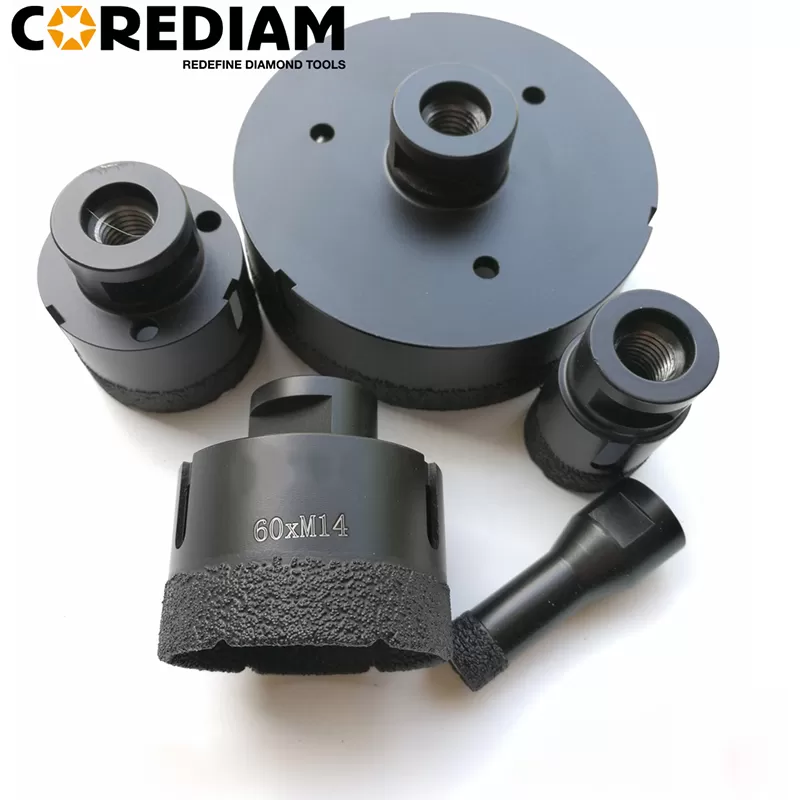What is the lifespan of a diamond drill bit?
The lifespan of a diamond drill bit can vary widely based on several factors, including the quality of the bit, the materials being drilled, the drilling conditions, and the operator's expertise. Here are key considerations that influence the lifespan of a diamond drill bit:
1. Diamond Quality:
The quality of the diamonds embedded in the drill bit is a primary factor. High-quality, industrial-grade diamonds are more durable and resist wear better than lower-grade diamonds. Bits with synthetic or low-quality diamonds may have a shorter lifespan.
2. Bit Construction:
The design and construction of the diamond drill bit impact its durability. Bits with reinforced steel cores and precision engineering tend to have longer lifespans. Additionally, the bonding matrix used to secure the diamonds plays a role in the bit's overall longevity.
3. Material Being Drilled:
The type of material being drilled significantly influences the lifespan of the diamond drill bit. Drilling through softer materials generally causes less wear on the diamonds compared to drilling through hard, abrasive materials like concrete, granite, or hard metals.
4. Drilling Conditions:
The conditions under which the diamond core drill bit operates affect its lifespan. Factors such as drilling speed, coolant or lubrication use, and the presence of dust or debris can impact wear. Proper cooling and lubrication can extend the bit's life by reducing heat-related stress.

5. Operator Skill and Technique:
The skill and technique of the operator also play a role. Proper drilling techniques, such as using the correct speed and pressure, can help maximize the lifespan of the diamond drill bit. Inexperienced or improper usage can lead to premature wear.
Featured content:Tips for Using Non-Sparking Tools Safely
Pattern Rollers: Transforming Surfaces with Artistic Imprints
How Do I Choose a Weldon End Mill Holder?
How long will a diamond blade last?
Non-Sparking Sockets and Accessories: A Crucial Component for Safety
What kind of roller do you use for epoxy flooring?
Which Cordless Drill is Best for Home Use?
6. Bit Size and Type:
Larger diameter bits may experience more wear than smaller ones due to increased surface area in contact with the material. Additionally, different types of diamond drill bits, such as core bits or hole saws, may have varying lifespans based on their intended applications.
7. Frequency of Use:
The frequency of use and the intensity of drilling operations impact the overall wear and tear on the diamond drill bit. Bits used for occasional projects may have a longer lifespan compared to those used daily in demanding applications.
8. Quality of Manufacturer:
The reputation and quality standards of the manufacturer are important. Diamond drill bits from reputable manufacturers with a focus on precision engineering and quality control are likely to have longer lifespans.
9. Re-Tipping and Maintenance:
Some diamond drill bits are designed to be re-tipped, allowing the user to replace the worn diamonds and extend the bit's life. Regular maintenance, such as cleaning and inspecting the bit, can also contribute to a longer lifespan.
10. Material Hardness Compatibility: - Matching the hardness of the material being drilled with the appropriate diamond hardness is crucial. Using a diamond drill bit with diamonds that are too hard or too soft for the material can lead to premature wear.
In summary, the lifespan of a diamond drill bit is influenced by a combination of factors, and there is no fixed duration. By considering the quality of the diamonds, bit construction, material being drilled, drilling conditions, operator technique, and other factors, users can optimize the performance and extend the lifespan of their diamond drill bits. Regular inspection and maintenance are essential to ensure efficient and effective drilling over time.
What is a DTH drill bit?
How to clean table saw blades
442
0
0
All Comments (0)
If you are interested in sending in a Guest Blogger Submission,welcome to write for us!


Comments